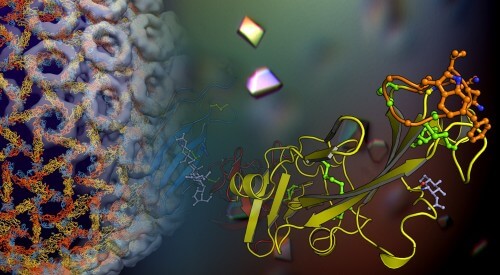The laboratory will be headed by Dr. Moshe Dessau, a crystallographer, biophysicist and biochemist by training, who studies infectious diseases with an emphasis on RNA viruses and eukaryotic parasites (with a cell nucleus)

In the Galilee Faculty of Medicine of Bar-Ilan University, a unique laboratory was established to study viruses of infectious diseases prevalent in the third world and neglected viral diseases. The laboratory is headed by Dr. Moshe Desau. For the purpose of the research, Dr. Dessau uses the tools of structural biology and biophysical techniques, one of the leading methods today for understanding the function of proteins at the atomic level. The purpose of the research is to find biological processes unique to viruses and parasites, and to analyze them at the structural level, in order to reach a very deep understanding of the infection processes, and hence to find treatment and vaccination solutions against these disease-causing agents.
Dr. Moshe Dessau, a crystallographer, biophysicist and biochemist by training, studies infectious diseases with an emphasis on RNA viruses and eukaryotic parasites (with a cell nucleus). Dr. Dessau did his post-doctoral training at Yale University, Connecticut, USA, in the laboratory of Prof. Yorgo Modis on the topic: entry, assembly and evolution of RNA viruses with a lipid envelope. Dr. Dessau's research has been published in prestigious scientific journals in Israel and around the world.
Dr. Dessau's group studies the organization and dynamics of macromolecular complexes (complexes built from proteins and/or nucleic acids such as DNA and RNA). The research in Dr. Dessau's laboratory tries to answer basic questions, such as: how are viruses structured, how does this structure help the virus both in entering and exiting the host cell?, how does the virus change structurally so that it can infect a new host; can we integrate the understanding Our structure on the viral infection stage with advanced methods in biophysics and cell biology, in order to develop innovative strategies for developing more effective vaccines?
Another issue that Dr. Dessau's group is investigating is the infection of humans by unicellular and multicellular parasites. Almost a third of the global medical burden of human disease is due to a wide variety of parasites. One out of six people in the world suffers from a disease caused by a parasite, therefore the study of eukaryotic parasites (having a cell nucleus) is an important and urgent field in a global perspective. The complexity of the life cycle of parasites makes understanding the mechanisms of action of the parasites at the molecular level challenging. Parasites use a variety of unique biological processes that do not exist in organisms or other eukaryotic cells. This understanding may provide information of crucial importance for the development of innovative drugs, based on the inhibition of the biological process specific to the parasite.
Most of the efforts in the laboratory are directed to determining the three-dimensional structure of macromolecules, in order to reach a deep understanding of their function during the viral and parasitic infection process. The determination of the three-dimensional structure of these macromolecules is done in Dr. Dessau's laboratory using advanced methods in molecular biology, biochemistry, and biophysics. These methods are at the cutting edge of biological science and are considered the most effective techniques for obtaining structural information on macromolecules at atomic resolution.
Dr. Dessau says that he chose to teach and research at the Faculty of Medicine in the Galilee due to the challenge and innovation of establishing a new laboratory in a new faculty. "The values of Zionism in the northern settlement and its development were an incentive for me, which led me to choose the faculty of medicine in the Galilee. The most advanced equipment, the faculty and the atmosphere in the faculty are an extremely important added value that strengthened my decision" says Dr. Dessau. "There is a tremendous mobilization and a lot of goodwill on the part of the faculty and on the part of Bar-Ilan University to support and help me as a researcher to achieve groundbreaking achievements."
